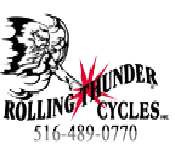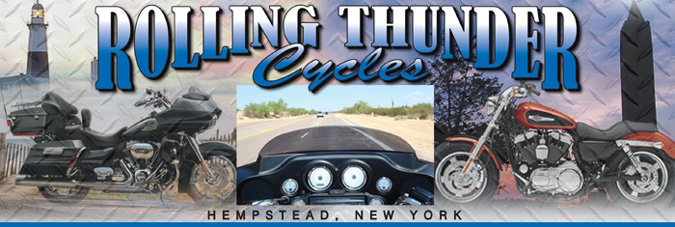
|
|
|
|
|
|
|
|
|
|
|
|
|
|
|
|
|
|
|
|
|
|
|
|
|
|
|
|
|
|
|
|
|
|
Search by Keyword
 |
| Click to enlarge image(s) |
Full service listing: All Models
_____ Change engine oil and filter replace o-ring as required
We recommend synthetic oils for all aluminum Harley-Davidson® engines. Synthetic oil has better cling for more protection on cold starts; it does not break down hot and will lower the overall operating temperature of your motorcycle by 8 degrees. Older engines should still use petroleum oils due to increased engine tolerances. If you are not sure just give us a call and we will let you know what is best for your application. Petroleum oils should be replaced every 2,500 miles or once a year, Synthetic oils should be replaced every 5,000 miles or once a year
_____ Change primary chain lube, clean drain plug, & replace o-ring
Wet clutch Harley-Davidson® motorcycles do not require heavy oil. We recommend synthetic primary chain case fluid to lube the primary chain and act as a coolant for the wet clutch. Petroleum primary chain case fluids are also available
_____ Check and adjust primary chain as needed
This is an important check on all pre-2007 models as you can loose performance through an improperly adjusted primary chain. 2007 and newer models are equipped with an automatic chain adjuster
_____ Check and adjust clutch release, free play and lube
Lubing and adjusting your bikes clutch cable will extend life and make operating the clutch in traffic easier. Clutch release end play creates the perfect friction zone and extends clutch life
_____ Change transmission lubricant, clean drain plug, replace o-ring (as required)
The transmission fluid on big twin engines is a separate fluid in the sealed transmission case. Although it does not get as hot as engine oil, the heating and cooling causes condensation to form which can damage internal parts. Here we also recommend synthetic fluid for ease of shifting and long life. Early model Harley-Davidson® motorcycles using bushings instead of bearings still need petroleum based heavier oil for proper lubrication.
_____ Check shifter lever Allen bolt on transmission condition and tightness
These grade 8 Allen bolts can stretch and cause shifter linkage to loosen eventually causing the need to replace the shift arm and possibly the shifter shaft in the transmission. Early replacement saves expensive repairs
_____ Check and adjust rear belt/chain, lube as required check for damage
Early model Harley-Davidson® motorcycles using rear chain drives require checking the free play adjustment, sprocket condition and lubrication (about every 500 to 1,000 miles) and generally last no more then 6,000 miles in New York traffic. Rear belts require less attention but debris can lodge between the rear sprocket and belt causing damage you’ll want to know about ahead of time
_____ Check mufflers for loose at mount clamps
New York potholes can ruin just about anything and hard impacts coupled with vibration can cause even the best exhaust system to loosen.
_____ Inspect, clean or replace tappet screen on required models
This screen catches debris before oil goes to the roller tappets and should be cleaned or replaced with every service on 1999 and older models
_____ Inspect air cleaner and service
Dirty air cleaners can rob performance, cause excess gas consumption, and increase carbon build-up in engines. Not Good!
_____ Change spark plugs
Spark plug technology has come a long way and is key to keeping your bike starting easy and running its best.
_____ Inspect oil lines, fuel lines and shock rubbers for dry rot
All rubber rots and the increase in Ethanol content in gasoline can cause fuel lines to deteriorate. It is always easier to repair before it fails.
_____ Inspect brake pads and disc wear
There is nothing like knowing your bike will stop when you need it to. Ask about new technology in brake pads to help increase breaking power even in ABS models
_____ Check brake fluid levels and condition of fluid
Even though brake fluid is sealed in both reservoirs the constant heating and cooling will cause it to break down and require replacing every few seasons.
_____ Check engine idle speed
Spit and stall problems can be common. Proper engine speed reduces spit and stalls when accelerating from traffic stop lights.
_____ Check operation of choke/enrichment and cold idle speed (Carb and EFI)
Proper operation of cold idle speed helps prevent spit and stall conditions and is very important in cold weather riding when engine warm-up times are longer
_____ Inspect fuel valve, lines and fittings for ease of operation and leaks
Carburetor model Harley-Davidson® motorcycles have manual fuel valves that can be difficult to move from run to reserve position when needed.
_____ Lube all pivot points and cables (throttle, clutch and drum brake cables, rear brake lever, clutch and brake pivots, shifter linkage heims etc.)
When your bikes controls operate easily the overall riding experience is more fun, and prevents parts from wearing out before they should.
_____ Check throttle and idle cables and adjust as required
Quick response and proper operation of your bikes acceleration system can sometimes get you out of a tight situation.
_____ Check steering bearing tension and fork fall away
Critical to your bikes handling both around town and at highway speeds is your fork bearing tension. This is one of the items that will cause your bike to fail inspection and is checked and adjusted as needed with every full service
_____ Grease steering bearings (as available) and all grease fittings on chassis
This part of routine maintenance is to extend bearing life on models with available fittings. Other models require the fork to be removed at certain factory recommended intervals.
_____ Check operation of electrical equipment, lighting, switches, horn
_____ Check front brake light switch for sticking and rear brake switch operation
_____ Check charging system output and battery terminal connections clean and lube
It’s always good to know your electrical system is working as it should
_____ Check tire air pressures and adjust, inspect thread depth, check for debris
Tire pressure changes at a rate of one (1) pound per 10 degrees of temperature. All tires will loose air when sitting. This should not only be checked during a full service but at least once a week
_____ Check wheel spokes for tight and wheel for true
Spoked wheels, especially rear wheels require more maintenance then mag wheels. So don’t only keep your chrome spokes clean, keep them tight too!
_____ Check ignition timing (XL models only)
With the quality of today’s gasoline, ignition ping can be a problem on older models the ignition timing can be adjusted to help compensate for lower quality gas.
_____ Road test upon completion of work
A road test is a very necessary part of a full service. Nothing tells the technician more about your motorcycle than driving it.
Over the years of performing full services on all makes and models of Harley-Davidson® motorcycles we have found a few additional items the factory does not list in their service manuals. These items listed below are just a few.
Touring:
_____ Check rear fender mounts to muffler supports for cracked or broken
_____ Check rear bumper at mount points for cracked or broken
_____ Check air pressure on front and rear suspension as required
_____ Check crossover exhaust pipe for cracked
Older Models:
_____ Check and adjust pushrods as required
_____ Inspect advance/retard mechanism and service repair and lube as required
*Fork oil changes and bearing services vary per model and are not listed here
Rolling Thunder Cycles Inc. is not affiliated with Harley-Davidson®
All logos, brands, images and trademarks are the property of their respective trademark holders.


